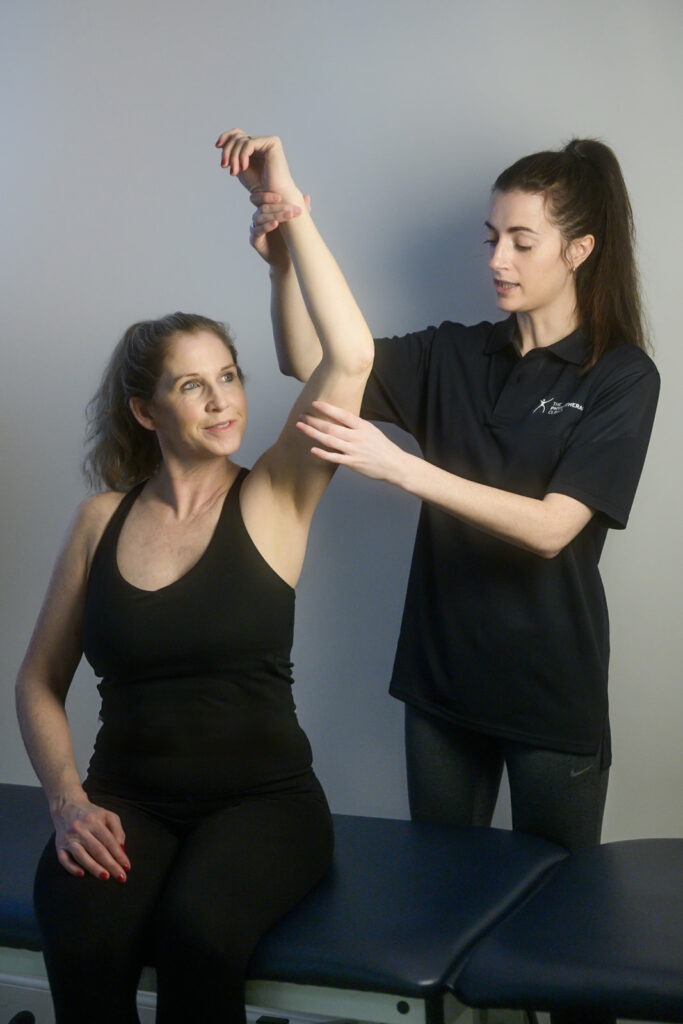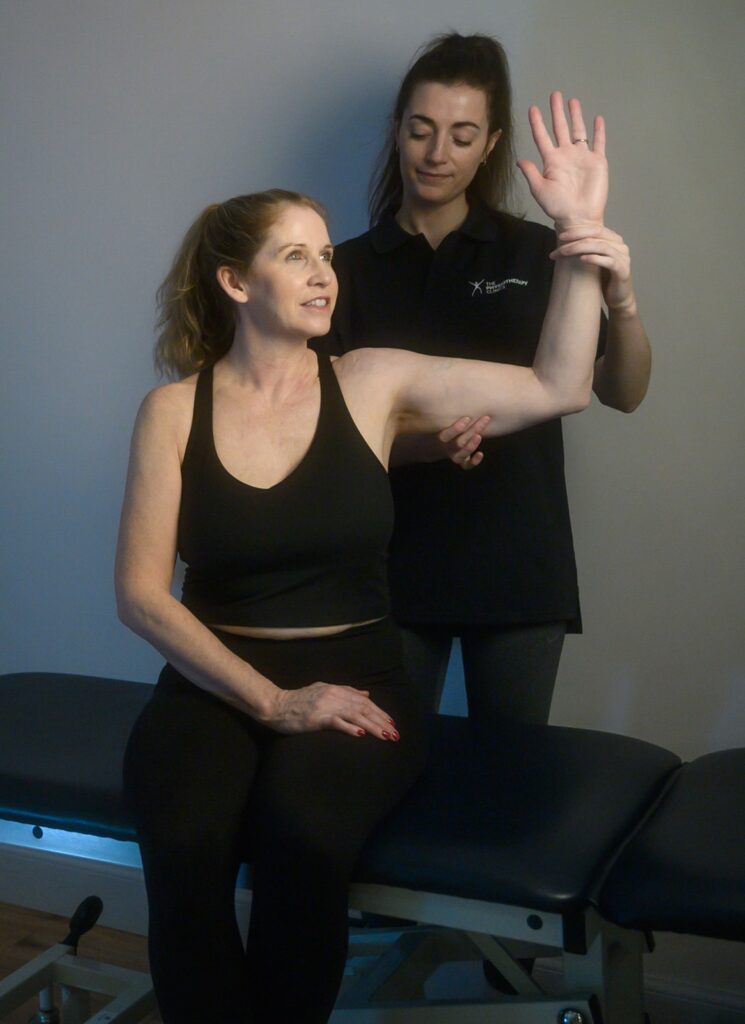
If your shoulder has started to become stiff and painful for no apparent reason, you may be developing a frozen shoulder.
A frozen shoulder, also known as adhesive capsulitis, is a condition characterized by stiffness and pain in the shoulder joint. It normally affects only one shoulder at a time. The exact cause of frozen shoulder is not always clear, but it involves the thickening and tightening of the capsule surrounding the shoulder joint. The condition typically progresses through three stages:
- Freezing stage (0 – 3 months) Pain and stiffness developing
- Frozen stage (3 – 9 months) Pain may reduce but stiffness remains
- Defrosting stage (9 – 18 months) Movement slowly returns over time
However, with early diagnosis and commencement of treatment the length of condition can be dramatically reduced. Let one of our experienced physiotherapy team carry out a detailed assess of your shoulder. They will then discuss the diagnosis and recommended treatment and management options that are available to help reduce the pain and limited movement associated with a frozen shoulder.
Here are some suggestions that may help reduce your shoulder pain:
- Relocate items stored in higher cupboards where you can reach then at waist height
- Try either heat or ice around the shoulder. You may find one better than the other to help reduce pain 2-3 times a day for 20 minutes. Avoid applying ice directly to your skin. Wrap the ice in a tea towel first
- Try to move the shoulder as often as you can to limit the developing stiffness

Find a location near you
The Physiotherapy Clinics - Gracemount
The Physiotherapy Clinics - Leith
The Physiotherapy Clinics - South Gyle
Peebles Physiotherapy
The Physiotherapy Clinics - Fairmilehead
EXCELLENTTrustindex verifies that the original source of the review is Google. I can't thank Peter enough for guiding me through my shoulder rehabilitation program over the past few months. His instructions were very clear and the instructional videos made available through the app were really useful. I'd had niggling, low-level pain in my shoulder for around 13 years and then recently I lost full range of motion due to a karate injury; after working with Peter I can honestly say that my shoulder now feels better and stronger than it has done for a very long time! Thanks again :-)Trustindex verifies that the original source of the review is Google. Very grateful. Great serviceTrustindex verifies that the original source of the review is Google. I received fantastic, friendly help from Biju for a minor leg injury. The treatment and exercises he gave me completely sorted my issue. Would 100% recommend both him and the clinic!Trustindex verifies that the original source of the review is Google. Had a great experience at this clinic. Antony put together a detailed treatment plan for treating knee pain. He clearly explained how each exercise would benefit the activities I wanted to be able to do. Not only is he a great physio, but he is so friendly and always makes you feel listened to.Trustindex verifies that the original source of the review is Google. Phil has been supporting me a long standing complicated issue, which previous places have been unable to help. Phil's extensive experience and positive approach, coupled with his willingness to think outside the box is making a difference. Recently this approach has included the 3D movement scan. It's very easy to participate in, and it revealed problematic postural and movement detail that would be harder to discover by other means. I recommend the 3D scan as a rehabilitation tool.Trustindex verifies that the original source of the review is Google. I highly recommend the physiotherapy clinic South Gyle. I received a detailed assessment of my problem from Phil. He clearly explained the issues I'm having and why, plus the treatment, exercises required to rectify. Really happy with my experience and I would not hesitate to go back. Thanks PhilTrustindex verifies that the original source of the review is Google. I first attended the South Gyle clinic to see Anthony Guiducci on February 2023. I was suffering from a very painful trapped nerve in the lower back. Later in the year, with the back issue having been virtually cleared, I developed some nerve pain in the right knee along with general stiffness in the left knee. Finally around late October I had "tennis elbow" on my right elbow.I should say that I am 73 years old and spent many years playing contact sports, mainly rugby and football and now in my twilight years golf. It catches up with you eventually 😁. All through this time Anthony has been totally professional with a great knowledge of muscle and nerve structure and their interaction. His approach to giving you remedial exercises is well structured to your ability and takes great care that you keep within your capabilities as you build up the strengthening and more testing lessons. I can highly recommend him to anyone looking for physio help with their injuries or aches and pains. I must also say that, on the odd occasion when I had to use other physios at South Gyle, due to holiday leave I was equally impressed by the expertise of the staff.Trustindex verifies that the original source of the review is Google. Came here with a mild hamstring strain, ran a 3:30 marathon 5 weeks later! Anthony Guiducci = legendTrustindex verifies that the original source of the review is Google. Really thorough consultation. Excellent advice and follow-up arranged.